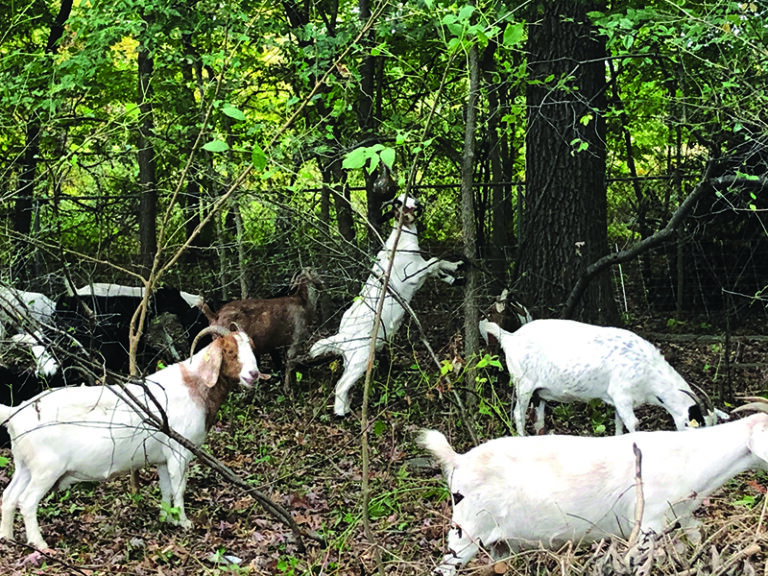
By Nicole Sandler
Northside News
If you happened to notice a herd of goats grazing on the Lake View Community School property a few months ago, it was not your imagination. These working goats, 40 in all, spent a week in the Lake View School forest tasked with an important job — to clear away unwanted brush and weeds. A herd this size can typically clear an entire acre of dense brush in 5‒7 days, and this group delivered.
Grazing goats are effective at clearing away invasive species without the need for chemicals, allowing native plants a chance to emerge and bloom in the spring. According to Lake View Outdoor Classroom Coordinator Susie Hobart, the school forest now has native plants Jack-in-the-pulpit, black-eyed Susan, aster, trillium, wild geranium and Virginia bluebell, to name just a few. Five years ago, when goats were first introduced in this fashion, only garlic mustard, buckthorn and thistle were able to thrive.
The use of goats for grazing and clearing is not a new practice. Goats are easier on the land and have become a part of the state’s natural plan to reduce invasive species. Fortunately, businesses like HaakHagen Goat Grazing have made that work their mission. Not only did HaakHagen provide the goats at Lake View this fall, they were also used last summer to graze three Madison parks. HaakHagen goats are available to graze residential areas within the business’s service area, which spans a one-hour drive from their farm in Poynette.
Greg Haak and Brooke Hushagen are friends and business partners and started the business in 2016. Both were working full-time management jobs in the area of natural resources but shared a passion for this type of work. They were both raised on dairy farms and love animals. “Goat grazing is a blend of farming and natural resource management, so it was a natural fit for us,” said Hushagen. Now in its sixth season of goat grazing, HaakHagen Goat Grazing is busy and improving the herd every year.
Lake View School’s outdoor classroom is exactly the kind of initiative that favors goats over chemicals to clear invasive species in its forest. Hobart and Lake View physical education teacher James Kersten lead the outdoor classroom program, which has blossomed since 2010 when the idea was just a vision of Lake View parents. The outdoor classroom started as a garden program that eventually expanded into the establishment of a school forest. The initiative is dependent on the community and grateful for its many partners to help maintain and build out new learning opportunities.
“The Lake View School forest offers a different outlet for students to learn,” explained Kersten. “Instead of sitting in a classroom under fluorescent lighting, students get out into the natural sunlight and breathe fresh air while learning.”
Hobart feels strongly that it’s more important today than ever before to help children become lovers of the outdoors. “If they play and learn today in the school forest, they will have memories and a lifelong connection to sustaining the natural world,” she said. “And research has shown us they will be healthier and happier.”
Lake View Community School principal, Nkauj Nou Vang-Vue, is particularly supportive of her school’s unique outdoor classroom and recognizes its importance on many levels. “When we talk about equity, engaging students in outdoor learning and activities is an equity move, ensuring that all students have the opportunity and easy access to exploring, understanding and engaging in the outdoors in meaningful ways.”